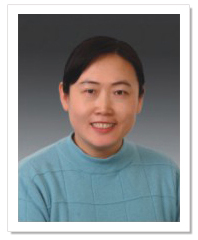 |
张淑平 |

张淑平 博士
教授
1998年,中国农业大学获得博士学位;
1998-2002年,清华大学、美国乔治亚大学、耶鲁大学,博士后/访问学者;
2000年至今,清华大学生命学院工作
主要研究领域、研究方向:
利用哺乳动物细胞和小鼠模型开展与发育及疾病相关的细胞信号转导机制的研究,特别是在两个方面:1. MGARP基因功能的研究;2. NOK/STYK1基因在肿瘤形成及转移过程中的作用及相关细胞信号网络的研究。
部分论文及教材(¶通信作者):
- NOK/STYK1 promotes the genesis and remodeling of blood and lymphatic vessels during tumor progression. Liu Y, Li T, Hu D, Zhang S(P) ¶. Biochem Biophys Res Commun. 2016, 478(1):254-9.
- Jia L#, Liang T#, Yu X, Ma C, Zhang S(P)¶. MGARP regulates mouse neocortical development via mitochondrial positioning. Mol Neurobiol. 2014, 49(3):1293–1308. (#Equal contribution)
- Zhou M#, Liang T#, Wang Y, Jin D, Wang J, Jia L, Zhang S(P)¶. Expression and tissue localization of renalase, a novel soluble FAD-dependent protein, in reproductive/steroidogenic systems. Mol Biol Rep. 2013,40:3987–3994. (#Equal contribution)
- Jin D, Li R, Mao D, Luo N, Wang Y, Chen S, Zhang S(P)¶. Mitochondria-localized glutamic acid-rich protein (MGARP) gene transcription is regulated by Sp1. PloS ONE. 2012 , 7 ( 11) e50053
- Li J, Wu F, Sheng F, Li YJ, Jin D, Ding X, Zhang S(P)¶. NOK/STYK1 interacts with GSK-3β and mediates Ser9 phosphorylation through activated Akt. FEBS letters. 2012( 586) 3787–3792
- Ding X, Jiang QB, Li R, Chen S, Zhang S(P)¶. NOK/STYK1 has a strong tendency towards forming aggregates and colocalises with epidermal growth factor receptor in endosomes, Biochem Biophys Res Commun. 2012, 421: 468–473.
- Zhou M#, Wang Y#, Qi S, Wang J, Zhang S(P)¶. A mitochondria-localized glutamic acid-rich protein is involved in HPG axis. Endocrinology. 2011, 152(6):2311-20. (#Equal contribution)
- Qi S, Wang Y, Zhou M, Ge Y, Yan Y, Wang J, Zhang SS, Zhang S(P) ¶. A mitochondria-localized glutamic acid-rich protein (MGARP/OSAP) is highly expressed in retina that exhibits a large area of intrinsic disorder. Mol Biol Rep. 2011, 38:2869-2877.
- Wang J,Qi SL, Cheng W, Li L, Wang F, Li YZ, Zhang S(P) ¶. Identification, expression and tissue distribution of a renalase homologue from mouse, Mol Biol Rep. 2008, 35:613-20.
- Zhang S(P)¶. A research-project-based and self-determined teaching system of molecular biology techniques for undergraduates, BMBE, 2008, 36(3):181-8.
- Li YH, Zhong S, Rong ZL, Ren YM, Li ZY, Zhang S(P), Chang Z, Liu L¶. The carboxyl terminal tyrosine 417 residue of NOK has an autoinhibitory effect on NOK-mediated signaling transductions. Biochem Biophys Res Commun. 2007, 356(2):444-9.
- Chen Y, Li YH, Chen XP, Gong LM, Zhang S(P), Chang ZJ, Zhang XF, Fu XY, Liu L¶.Point mutation at single tyrosine residue of novel oncogene NOK abrogates tumorigenesis in nude mice. Cancer Res. 2005, 65(23):10838-46.
- Li YH, Wang YY, Zhong S, Rong ZL, Ren YM, Li ZY, Zhang S(P), Chang ZJ, Liu L¶. Transmembrane helix of novel oncogene with kinase-domain (NOK) influences its oligomerization and limits the activation of RAS/MAPK signaling. Mol Cells. 2009, 27(1):39-45.
- Zhang Y, Li T, Fu L, Yu C, Li Y, Xu X, Wang Y, Ning H, Zhang S, Chen W, Babiuk LA, Chang Z¶. Silencing SARS-CoV Spike protein expression in cultured cells by RNA interference,Biochem Biophys Res Commun. 2004,26;324(4):1186-93.
- Liu L, Yu XZ, Li TS, Song LX, Chen PL, Suo TL, Li YH, Wang SD, Chen Y, Ren YM, Zhang S(P), Chang ZJ, Fu XY¶. A novel protein tyrosine kinase NOK that shares homology with platelet-derived growth factor/fibroblast growth factor receptors induces tumorigenesis and metastasis in nude mice. Cancer Res. 2004, 64(10):3491-9.
- Li L, Xin H, Xu X, Huang M, Zhang X, Chen Y, Zhang S(P), Fu XY, Chang Z¶. CHIP Mediates Degradation of Smad Proteins and Potentially Regulates Smad-Induced Transcription. Mol Cell Biol. 2004, 24(2):856-864.
- Xiong S, Zhao Q, Rong Z, Huang G, Huang Y, Chen P, Zhang S(P), Liu L, Chang Z¶. hSef inhibits PC12 cell differentiation by interfering with Ras-MAPK signaling, J Biol Chem. 2003,278: 50273-50282.
联系方式:
电 话:+86-10-62773628(O); +86-010-62795470(L)
E-mail:bczhang@mail.tsinghua.edu.cn/shpzhang@biomed.tsinghua.edu.cn
|
|
|
|

